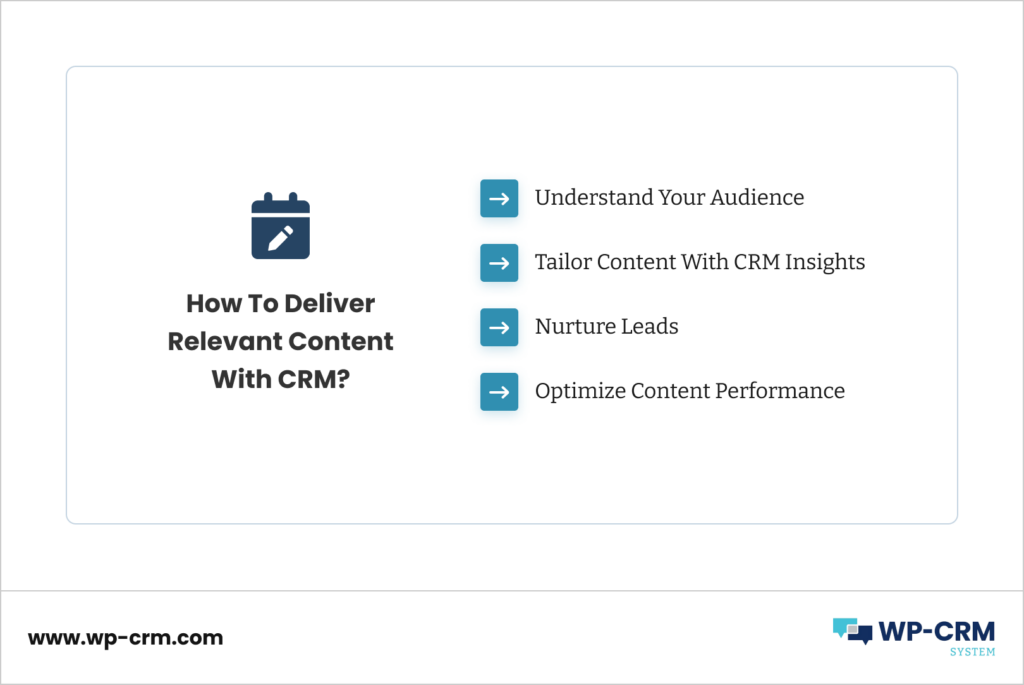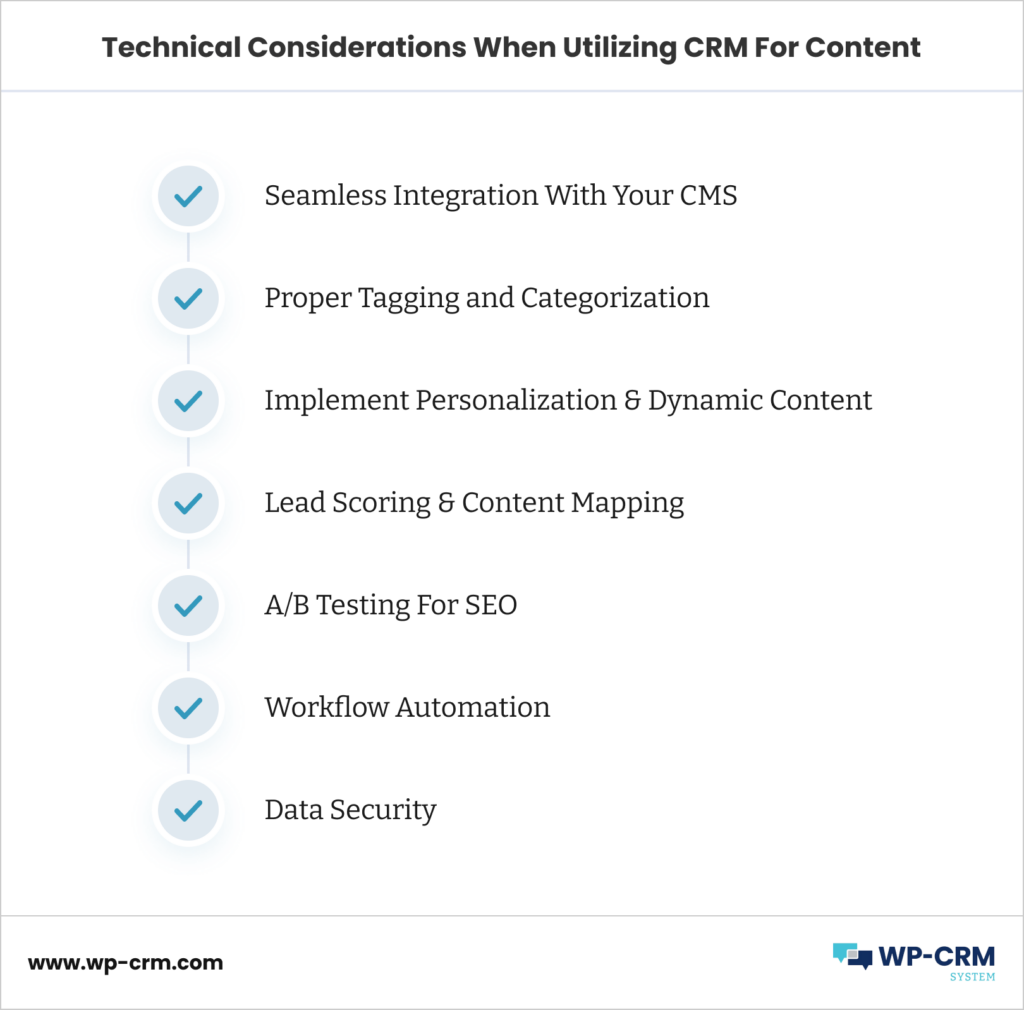Delivering Relevant Content: The Power of CRM In Content Marketing
In the fast-paced world of digital marketing, delivering relevant content to the right audience is paramount to success. Content marketing has become an essential ingredient for businesses aiming to attract, engage, and convert customers. However, content creation and distribution that truly resonates with your target audience can be a challenge. This is where the value of CRM for marketing becomes more apparent.
In this article, we will explore how CRM can revolutionize your content marketing efforts, enabling you to deliver tailored and impactful content that drives results.
How To Deliver Relevant Content Using CRM?

Understand Your Audience
To create content that resonates with your audience, you need a deep understanding of who they are, their needs, and their preferences. Our WP-CRM system plugin can help you gather and organize valuable customer data, This includes demographics, behavior patterns, and purchase history.
By leveraging these insights, you can segment your audience into distinct groups, allowing you to personalize your content. As a result, you’d be able to target specific messages to each segment. By strategically utilizing CRM for marketing , you can easily identify the pain points, interests, and motivations of your audience. This can be quite helpful to craft content that addresses their unique challenges and desires.
Tailor Content with CRM Insights
Armed with the insights provided by CRM, you can create highly targeted and personalized content. By analyzing customer interactions and preferences, you can identify trends and patterns that inform your content creation strategy.
For example, if you notice a group of customers frequently engaging with content related to a specific topic, you can develop more content around that subject to cater to their interests.
CRM systems also allow you to track customer engagement across various channels, such as email, social media, and website interactions. This data can help you identify the most effective content formats, distribution channels, and optimal timing for reaching your audience.
Nurture Leads with CRM-Driven Content
CRM systems enable you to move beyond one-time content interactions and nurture leads throughout the buyer’s journey. By leveraging CRM data, you can create automated email campaigns that deliver targeted content based on the recipient’s preferences and behavior.
For instance, if a lead downloads an e-book on a specific topic, you can follow up with related content and personalized recommendations. By providing valuable and relevant content at each stage of the customer journey, you build trust, establish your expertise, and increase the likelihood of conversion.
Measure and Optimize Content Performance
CRM systems offer robust analytics capabilities that allow you to measure the performance of your content marketing efforts. By tracking metrics such as click-through rates, conversion rates, and customer engagement, you can gain valuable insights into what content resonates with your audience and drives desired outcomes. This data empowers you to optimize your content strategy by focusing on high-performing content and making informed decisions about future content creation and distribution.
Technical Considerations When Utilizing CRM

Integration with CMS
Integrating your CRM system with your Content Management System (CMS) is essential for seamless content management. This allows for the smooth flow of data between the two systems, enabling automated processes like capturing leads directly into the CRM from content forms and syncing customer data between the CRM and CMS. By integrating these systems, you can streamline content creation, distribution, and tracking, ensuring that your content marketing efforts are aligned with your CRM strategy.
Tagging and Categorization for Effective Content Organization
Proper tagging and categorization of content is crucial for efficient content organization. By implementing a foolproof tagging system based on CRM insights, you can classify and organize your content based on various attributes such as topic, format, target audience, and stage of the buyer’s journey.
This level of organization enables you to create dynamic content segments based on these tags, ensuring that the right content reaches the right audience at the right time. Effective tagging and categorization facilitate personalized and targeted content experiences for your audience.
Implement Personalization and Dynamic Content using CRM Insights
CRM systems provide valuable insights into customer preferences and behavior, allowing you to implement personalized and dynamic content. By leveraging CRM data, you can adjust content elements in real-time based on user preferences and behavior. This could involve modifying headlines, images, calls to action, and even product recommendations to align with individual interests. The implementation of personalization and dynamic content enhances the user experience, increases engagement, and improves conversion rates by delivering content that resonates on a personal level.
Utilize Lead Scoring and Content Mapping for Targeted Content Delivery
Lead scoring is a technique used in CRM systems to assess the level of interest and engagement of leads. By assigning scores based on specific actions and interactions with your content, you can identify highly engaged leads and prioritize them for further nurturing.
Additionally, content mapping involves assigning different content assets to each stage of the buyer’s journey. As leads engage with your content, their actions and interactions contribute to their lead score, indicating their readiness to move to the next stage. This insight helps you deliver the right content to the right leads, ensuring a more targeted and effective nurturing process.
A/B Testing and Experimentation for Content Optimization
CRM systems provide valuable data for conducting A/B testing and experimentation to optimize your content marketing strategy. A/B testing involves creating different versions of content and testing them against specific segments within your CRM. This experimentation can involve variations in content format, messaging, visuals, and distribution channels. By analyzing the results, you can improve your content marketing efforts.
Automation and Workflows to Streamline Content Marketing Processes
Automation plays a crucial role in CRM-driven content marketing. By leveraging workflow automation capabilities within your CRM system, you can automate repetitive tasks such as sending personalized content emails, updating customer records based on content interactions, and triggering specific actions based on predefined rules.
Automation streamlines your content marketing processes, reduces manual efforts, and ensures consistent and timely delivery of content to your audience. Workflow automation also enables you to nurture leads at scale, allowing you to focus on high-value interactions and strategic content planning.
Data Security and Compliance Considerations for CRM Implementation
When implementing CRM systems for content marketing, it is essential to prioritize data security and compliance. Ensure your CRM system complies with relevant data protection regulations, such as GDPR or CCPA, to safeguard customer data.
Implement secure access controls, encryption measures, and regular data backups to protect customer information. Additionally, adhere to privacy policies and obtain proper consent for data usage. Prioritizing data security and compliance builds trust with your audience. Also, this way you can rest assured that their information is responsibly handled.
Key Takeaways
In conclusion, a CRM system is a game-changer for businesses looking to deliver relevant content in their marketing efforts. By combining CRM insights with content marketing strategies, companies can create personalized experiences, nurture leads effectively, optimize content performance, streamline processes, and ensure data security and compliance. Embracing the power of CRM-driven content marketing through the WP-CRM system is a strategic investment that yields long-term benefits in engaging and captivating the target audience, ultimately driving business success.
Author bio: Marc Bartolome is a seasoned marketing professional with a passion for driving brand growth and engagement. With a diverse background in digital marketing and content strategy, Marc has a proven track record of delivering innovative campaigns and measurable results. As a dynamic leader and creative thinker, he continually strives to exceed expectations and stay ahead in the ever-evolving marketing world. Connect with Marc to stay updated on his latest industry insights and achievements.

